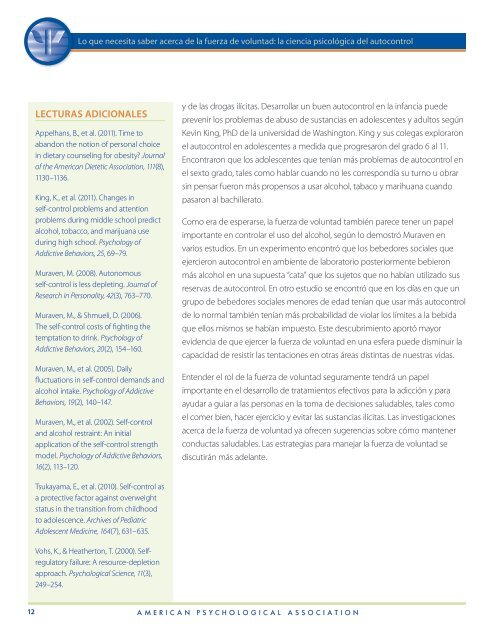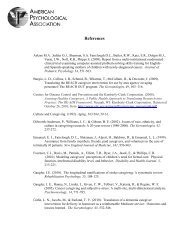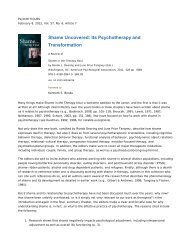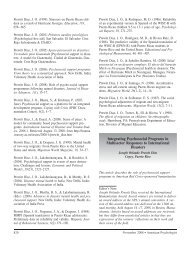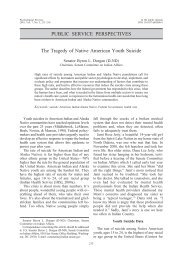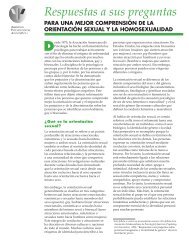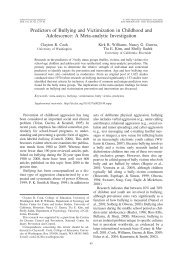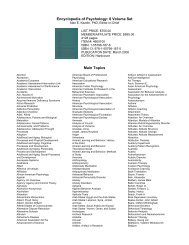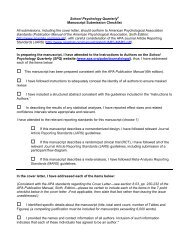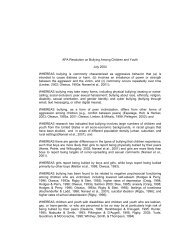La Fuerza de Voluntad - American Psychological Association
La Fuerza de Voluntad - American Psychological Association
La Fuerza de Voluntad - American Psychological Association
Create successful ePaper yourself
Turn your PDF publications into a flip-book with our unique Google optimized e-Paper software.
12<br />
Lo que necesita saber acerca <strong>de</strong> la fuerza <strong>de</strong> voluntad: la ciencia psicológica <strong>de</strong>l autocontrol<br />
LEctUrAS AdiciOnALES<br />
Appelhans, B., et al. (2011). Time to<br />
abandon the notion of personal choice<br />
in dietary counseling for obesity? Journal<br />
of the <strong>American</strong> Dietetic <strong>Association</strong>, 111(8),<br />
1130–1136.<br />
King, K., et al. (2011). Changes in<br />
self-control problems and attention<br />
problems during middle school predict<br />
alcohol, tobacco, and marijuana use<br />
during high school. Psychology of<br />
Addictive Behaviors, 25, 69–79.<br />
Muraven, M. (2008). Autonomous<br />
self-control is less <strong>de</strong>pleting. Journal of<br />
Research in Personality, 42(3), 763–770.<br />
Muraven, M., & Shmueli, D. (2006).<br />
The self-control costs of fighting the<br />
temptation to drink. Psychology of<br />
Addictive Behaviors, 20(2), 154–160.<br />
Muraven, M., et al. (2005). Daily<br />
fluctuations in self-control <strong>de</strong>mands and<br />
alcohol intake. Psychology of Addictive<br />
Behaviors, 19(2), 140–147.<br />
Muraven, M., et al. (2002). Self-control<br />
and alcohol restraint: An initial<br />
application of the self-control strength<br />
mo<strong>de</strong>l. Psychology of Addictive Behaviors,<br />
16(2), 113–120.<br />
Tsukayama, E., et al. (2010). Self-control as<br />
a protective factor against overweight<br />
status in the transition from childhood<br />
to adolescence. Archives of Pediatric<br />
Adolescent Medicine, 164(7), 631–635.<br />
Vohs, K., & Heatherton, T. (2000). Selfregulatory<br />
failure: A resource-<strong>de</strong>pletion<br />
approach. <strong>Psychological</strong> Science, 11(3),<br />
249–254.<br />
y <strong>de</strong> las drogas ilícitas. Desarrollar un buen autocontrol en la infancia pue<strong>de</strong><br />
prevenir los problemas <strong>de</strong> abuso <strong>de</strong> sustancias en adolescentes y adultos según<br />
Kevin King, PhD <strong>de</strong> la universidad <strong>de</strong> Washington. King y sus colegas exploraron<br />
el autocontrol en adolescentes a medida que progresaron <strong>de</strong>l grado 6 al 11.<br />
Encontraron que los adolescentes que tenían más problemas <strong>de</strong> autocontrol en<br />
el sexto grado, tales como hablar cuando no les correspondía su turno u obrar<br />
sin pensar fueron más propensos a usar alcohol, tabaco y marihuana cuando<br />
pasaron al bachillerato.<br />
Como era <strong>de</strong> esperarse, la fuerza <strong>de</strong> voluntad también parece tener un papel<br />
importante en controlar el uso <strong>de</strong>l alcohol, según lo <strong>de</strong>mostró Muraven en<br />
varios estudios. En un experimento encontró que los bebedores sociales que<br />
ejercieron autocontrol en ambiente <strong>de</strong> laboratorio posteriormente bebieron<br />
más alcohol en una supuesta “cata” que los sujetos que no habían utilizado sus<br />
reservas <strong>de</strong> autocontrol. En otro estudio se encontró que en los días en que un<br />
grupo <strong>de</strong> bebedores sociales menores <strong>de</strong> edad tenían que usar más autocontrol<br />
<strong>de</strong> lo normal también tenían más probabilidad <strong>de</strong> violar los límites a la bebida<br />
que ellos mismos se habían impuesto. Este <strong>de</strong>scubrimiento aportó mayor<br />
evi<strong>de</strong>ncia <strong>de</strong> que ejercer la fuerza <strong>de</strong> voluntad en una esfera pue<strong>de</strong> disminuir la<br />
capacidad <strong>de</strong> resistir las tentaciones en otras áreas distintas <strong>de</strong> nuestras vidas.<br />
Enten<strong>de</strong>r el rol <strong>de</strong> la fuerza <strong>de</strong> voluntad seguramente tendrá un papel<br />
importante en el <strong>de</strong>sarrollo <strong>de</strong> tratamientos efectivos para la adicción y para<br />
ayudar a guiar a las personas en la toma <strong>de</strong> <strong>de</strong>cisiones saludables, tales como<br />
el comer bien, hacer ejercicio y evitar las sustancias ilícitas. <strong>La</strong>s investigaciones<br />
acerca <strong>de</strong> la fuerza <strong>de</strong> voluntad ya ofrecen sugerencias sobre cómo mantener<br />
conductas saludables. <strong>La</strong>s estrategias para manejar la fuerza <strong>de</strong> voluntad se<br />
discutirán más a<strong>de</strong>lante.


